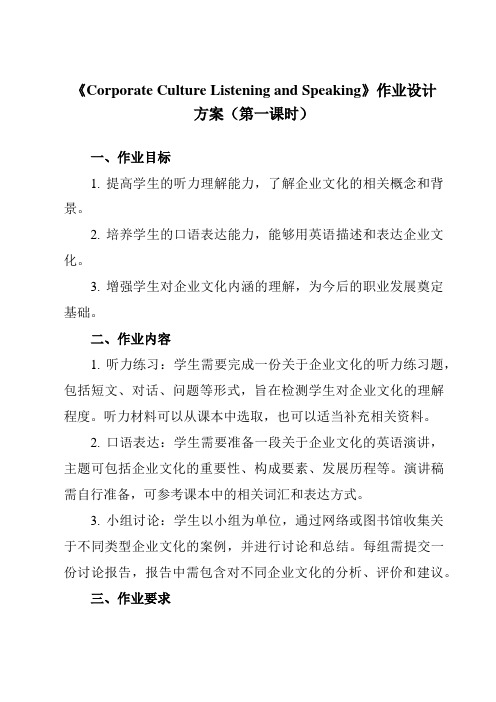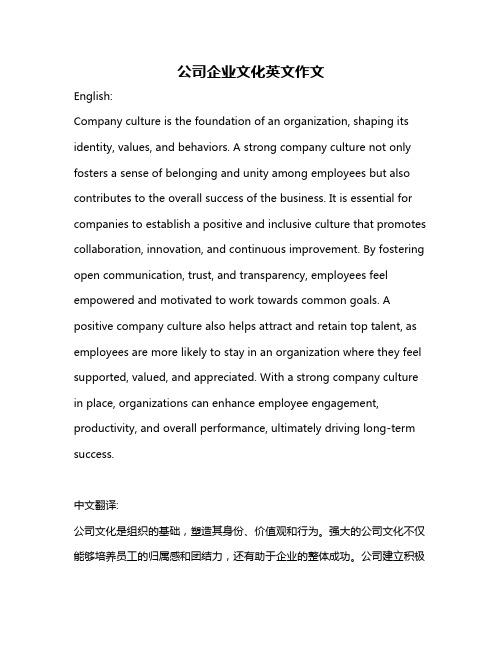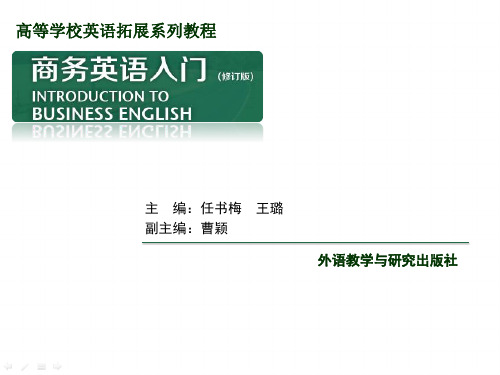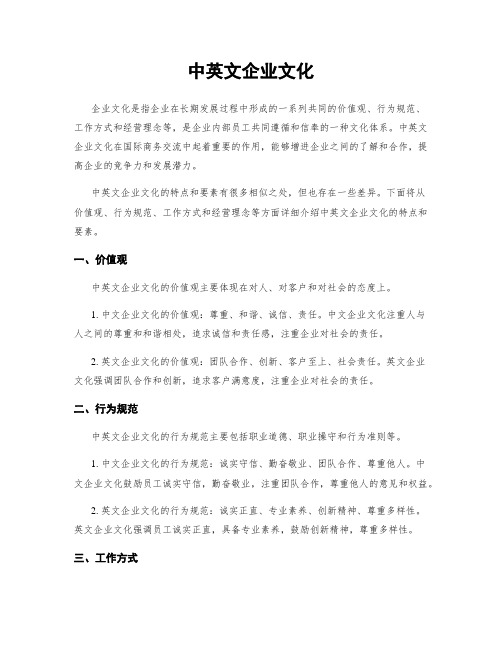商务英语企业文化
《Unit 4 Corporate Culture Listening and Speaking》作

《Corporate Culture Listening and Speaking》作业设计方案(第一课时)一、作业目标1. 提高学生的听力理解能力,了解企业文化的相关概念和背景。
2. 培养学生的口语表达能力,能够用英语描述和表达企业文化。
3. 增强学生对企业文化内涵的理解,为今后的职业发展奠定基础。
二、作业内容1. 听力练习:学生需要完成一份关于企业文化的听力练习题,包括短文、对话、问题等形式,旨在检测学生对企业文化的理解程度。
听力材料可以从课本中选取,也可以适当补充相关资料。
2. 口语表达:学生需要准备一段关于企业文化的英语演讲,主题可包括企业文化的重要性、构成要素、发展历程等。
演讲稿需自行准备,可参考课本中的相关词汇和表达方式。
3. 小组讨论:学生以小组为单位,通过网络或图书馆收集关于不同类型企业文化的案例,并进行讨论和总结。
每组需提交一份讨论报告,报告中需包含对不同企业文化的分析、评价和建议。
三、作业要求1. 听力练习:学生需认真听录音,理解短文和对话的内容,并回答相关问题。
完成练习后,请批改并提交作业。
2. 口语表达:学生需在规定时间内完成演讲,语音、语调和语速要适中,表达清晰。
演讲完成后,请自行录音并提交作业。
3. 小组讨论:学生需积极参与小组讨论,充分表达自己的观点和建议。
讨论完成后,每组需提交一份完整的讨论报告,报告中需包含小组每位成员的贡献和评价。
4. 作业提交:请在规定时间内提交作业,逾期提交将不予计分。
提交时请注明作业类型(听力练习、口语表达、小组讨论)和组别。
四、作业评价1. 听力练习:根据学生的答题情况和提交的录音文件,教师将对学生的听力理解能力进行评价。
2. 口语表达:教师将根据学生的演讲表现和录音文件,对学生的口语表达能力进行评价。
3. 小组讨论:教师将根据小组讨论的参与度、贡献和报告质量,对学生的团队合作和问题分析能力进行评价。
五、作业反馈部分教师将在作业评价后向学生提供反馈,包括对作业的整体评价、个人表现和建议。
公司企业文化英文作文

公司企业文化英文作文English:Company culture is the foundation of an organization, shaping its identity, values, and behaviors. A strong company culture not only fosters a sense of belonging and unity among employees but also contributes to the overall success of the business. It is essential for companies to establish a positive and inclusive culture that promotes collaboration, innovation, and continuous improvement. By fostering open communication, trust, and transparency, employees feel empowered and motivated to work towards common goals. A positive company culture also helps attract and retain top talent, as employees are more likely to stay in an organization where they feel supported, valued, and appreciated. With a strong company culture in place, organizations can enhance employee engagement, productivity, and overall performance, ultimately driving long-term success.中文翻译:公司文化是组织的基础,塑造其身份、价值观和行为。
英语通知作文企业文化

英语通知作文企业文化English:Dear team members,We would like to inform you about our company culture, which is based on the values of integrity, respect, teamwork, and innovation. Integrity is the foundation of everything we do, from how we interact with customers to how we treat each other within the company. Respect is essential in our workplace, as we believe in treating everyone with dignity and understanding. Teamwork is highly valued here, as we know that collaboration and communication are key to our success. Lastly, innovation is at the core of our culture, as we encourage all employees to think creatively and find new solutions to challenges. By embracing these values, we can continue to foster a positive and productive work environment for all.Thank you for your attention to this important aspect of our company.Best regards,[Company Name]Chinese:亲爱的团队成员,我们想向您介绍我们公司的企业文化,其基于诚信、尊重、团队合作和创新价值观。
企业文化英语标语

企业文化英语标语Enterprise Culture English SloganGood corporate culture is the foundation of a successful enterprise. It reflects the company's values, beliefs, and principles, which guide the behavior and attitudes of employees. An effective corporate culture can inspire employees, enhance teamwork, and drive the company towards its goals. In today's competitive business environment, a strong enterprise culture can be a powerful competitive advantage.One key aspect of corporate culture is the use of English slogans and taglines. These concise and impactful phrases can convey the essence of a company's identity and values to both employees and customers. A well-crafted English slogan can resonate globally, transcending language and cultural barriers.When developing an effective enterprise culture English slogan, it is important to consider several key factors. Firstly, the slogan should be aligned with the company's overall vision, mission, and strategic objectives. It should capture the essence of the organization's purpose and values in a memorable and inspirational way.Secondly, the slogan should be easily understood and resonate with the target audience. It should be simple, yet powerful, using clear and concise language that conveys the message effectively. Avoid overly complex or jargon-heavy phrases that may confuse or alienate the reader.Thirdly, the slogan should be unique and differentiated from competitors. It should help the company stand out in the market and create a distinctive brand identity. A memorable and distinctive slogan can be a powerful tool for building brand recognition and recall.One example of an effective enterprise culture English slogan is "Think Different" by Apple. This simple yet profound phrase encapsulates the company's innovative spirit and commitment to challenging the status quo. It has become synonymous with Apple's brand identity and has resonated with customers around the world.Another example is "Just Do It" by Nike. This slogan has become a rallying cry for athletes and fitness enthusiasts, inspiring them to push their limits and achieve their goals. It reflects Nike's brand values of determination, perseverance, and the pursuit of excellence.In addition to developing a powerful slogan, companies should alsoconsider other ways to reinforce their enterprise culture through the use of English. This may include creating mission statements, core values, and employee guidelines that are clearly communicated in English. By consistently using English in these key communications, the company can ensure that its culture and values are understood and embraced by all employees, regardless of their native language.Furthermore, companies should consider incorporating English into their employee training and development programs. This can include conducting training sessions, workshops, and team-building activities in English, as well as providing language learning resources and opportunities for employees to improve their English proficiency.By embracing English as a key component of their enterprise culture, companies can foster a more globally-oriented and collaborative work environment. Employees who are comfortable communicating in English can more effectively collaborate with colleagues from diverse backgrounds, share best practices, and contribute to the company's overall success.In conclusion, the use of English slogans and other English-based communications can be a powerful tool for building a strong and effective enterprise culture. By aligning these elements with the company's core values and strategic objectives, organizations can create a unique and inspiring brand identity that resonates withemployees and customers alike. Through a consistent and thoughtful approach to English-based communications, companies can cultivate a culture of innovation, teamwork, and global excellence.。
商务英语入门第三章_外教社修订版

Corporate social responsibility is the awareness that business activities have an impact on society, and the consideration of that impact by firms in decision making.
企业文化对企业氛围以及企业管理行为的影响
3
Chapter
Corporate Ethics and Corporate Culture
Lead-in activities
In advertising, having an unclear or misleading price might help promote a product, but is it ethical?
3
Chapter
Corporate Ethics and Corporate Culture
Corporate Ethics
Good corporate ethics can make companies successful, like Chipotle Mexican Grill. But the violation of ethics can make them difficult to maintain trust and goodwill, like Copley Pharmaceutical, Inc.
作为企业个性的文化
Different Corporate Cultures 不同的企业文化 Creation of Corporate Culture 企业文化的创建 Mechanisms for Transmitting Corporate Culture
BEC商务英语高级Corporate Culture企业文化

1 cut-throat 2 back-up 3 get-togethers 4 sink or swim 5 red tape 6 publicly accountable 7 streamlining 8 dotcom 9 yardstick 10 rat race
a. informal meetings b. Internet company c. making more efficient d. Paperwork e. responsible to the government f. standard by which you can judge the success of something g. fierce; not involving consideration or care about any harm caused to others h. struggle of individuals in a competitive environment i. succeed or fail without help from anyone else j. support
• What things can managers do to change the corporate culture of the company where they work?
What organizational benefits are associated with what organizational cultures?
Describe the culture of the company where you work or a company you are familiar with, using the following procedure.
【商务英语】企业文化(英汉对照)

美式论文、报告写作技巧编者按:美式教育的特点即是课程内容强调学生参与及创新运用,因此,报告便成了常见的考核学生学习成果的方式,比如实验报告、学期报告、专题报告、研究报告及论文(含毕业论文)等。
研究生presentation 及seminar 的机会更是占很大的比重,有些甚至占学期成绩很大比例。
如何完成报告、论文同时得到良好的成绩,是本文提供给有志留学的有心人参考的目的。
美国大学生由於自小已养成自动寻找答案习惯,在启发式的教育环境下,写报告、论文对他们来说比较不陌生,虽然专业知识上美国学生不见得比外籍学生强,但是表达能力由於自小培养,加上英语能力的优势,常比外籍学生在报告、论文方面有较隹的利基。
反之中国学生比较缺乏报告写作的训练,因此如果在留学过程中无法适应美式教育会比较辛苦,其实论文、报告的写作要领其实不难,只要把握技巧就可水到渠成。
通常论文由篇首(Preliminaries),本文(Texts)以及参考资料(References)三部分构成;而这三大部分各自内容如下:(一) 篇首:封面(Title)序言(Preface)谢词(Acknowledge)提要(Summary)目录(Tables and Appendixes)(二) 本文:引言(Introduction)主体,含篇(Part)、章(Chapter)、节(Section) 、以及注释(Footnotes)(三)参考资料:参考书目(References or Bibliography)附录资料(Appendix)。
进行论文或报告写作之前,先要确定想要表达的主题,主题确定后,将其具体表达,即为题目。
题目可以提供研究者:一.研究的方向二.研究的范围三.资料搜集的范围四.预期研究成果通常在确定题目之後就开始找资料从事研究,建议在找资料之前最好去问教授有哪些参考资料来源可供参考引用。
构思为确定写作大纲或Proposal 的先前步骤,大纲是论文、报告的骨干,Proposal 是研究的架构、流程及范围的说明书。
中英文企业文化

中英文企业文化企业文化是指企业在长期发展过程中形成的一系列共同的价值观、行为规范、工作方式和经营理念等,是企业内部员工共同遵循和信奉的一种文化体系。
中英文企业文化在国际商务交流中起着重要的作用,能够增进企业之间的了解和合作,提高企业的竞争力和发展潜力。
中英文企业文化的特点和要素有很多相似之处,但也存在一些差异。
下面将从价值观、行为规范、工作方式和经营理念等方面详细介绍中英文企业文化的特点和要素。
一、价值观中英文企业文化的价值观主要体现在对人、对客户和对社会的态度上。
1. 中文企业文化的价值观:尊重、和谐、诚信、责任。
中文企业文化注重人与人之间的尊重和和谐相处,追求诚信和责任感,注重企业对社会的责任。
2. 英文企业文化的价值观:团队合作、创新、客户至上、社会责任。
英文企业文化强调团队合作和创新,追求客户满意度,注重企业对社会的责任。
二、行为规范中英文企业文化的行为规范主要包括职业道德、职业操守和行为准则等。
1. 中文企业文化的行为规范:诚实守信、勤奋敬业、团队合作、尊重他人。
中文企业文化鼓励员工诚实守信,勤奋敬业,注重团队合作,尊重他人的意见和权益。
2. 英文企业文化的行为规范:诚实正直、专业素养、创新精神、尊重多样性。
英文企业文化强调员工诚实正直,具备专业素养,鼓励创新精神,尊重多样性。
三、工作方式中英文企业文化的工作方式主要包括沟通方式、决策方式和管理方式等。
1. 中文企业文化的工作方式:注重面对面沟通,倾听员工意见,注重集体决策,强调关怀和支持型管理。
2. 英文企业文化的工作方式:注重有效沟通,鼓励员工表达意见,注重快速决策,强调结果导向和授权型管理。
四、经营理念中英文企业文化的经营理念主要包括企业使命、愿景和核心价值观等。
1. 中文企业文化的经营理念:以人为本,追求共赢。
中文企业文化以人为本,注重员工的发展和福利,追求与客户、合作伙伴的共赢。
2. 英文企业文化的经营理念:追求卓越,持续创新。
- 1、下载文档前请自行甄别文档内容的完整性,平台不提供额外的编辑、内容补充、找答案等附加服务。
- 2、"仅部分预览"的文档,不可在线预览部分如存在完整性等问题,可反馈申请退款(可完整预览的文档不适用该条件!)。
- 3、如文档侵犯您的权益,请联系客服反馈,我们会尽快为您处理(人工客服工作时间:9:00-18:30)。
1.Corporate Culture企业文化(企业个性,形成于企业生产经营实
践之中,为全体员工所认同并且遵守的、带有本组织特点的使命
总之精神价值观和经营理念,以及这些理念在生产经营实践、管理制度、员工行为方式和企业对外形象的体现的总和。
为企业灵魂,推动其发展动力。
有有形与无形之分。
)
?The personality of an organization(warm, aggressive, friendly, open, innovative, conservative, and so on.)
?Guides how employees think, act and feel
is a broad term used to define the unique personality or character of a particular company or organization, and includes such elements as
core values(核心价值观)and beliefs, corporate ethics, and rules of behavior.
2.Functions of Corporate Culture企业文化的主要功能
Three key functions are:
?Provide a sense of identity for members.导向功能:对每个员工价值取向及行为取向的导向功能
?Generate commitment to the organization’s mission.凝聚功能:一种价值观被员工所认同后产生巨大的向心力和凝聚力。
?Clarify and reinforce standards of behavior. 约束功能:软约束。
产生于企业文化的氛围、群体行为准则和道德规范。
3.Culture as the Organization’s Personality作为企业个性的文化
1)Risk Taking Personalities喜欢冒险个性:Organizations encourage employees to take risks. (Virgin Group)
2)Attention to Detail Personalities注重细节个性:Organizations focus attention on the details of the organization where they
have made quality their driving themes.
3)Outcome Oriented Personalities注重结果的个性:Organizations focus on results in certain aspects of their business.(Customer
services)
4)People Orientation Personalities以人为本的个性:Organizations treat employees as “family”.
5)Team Orientation Personalities注重团队的个性:Organizations shape their cultures around the team concept.
6)Aggressive Personalities积极进取的个性:Organizations value aggressiveness as a major part of the way that business is done. 7)Nonstable Personalities不求稳的个性:Companies emphasize growth could be identified as having nonstable Personalities.
4.Different Corporate Cultures 不同的企业文化:企业文化的本质
是企业员工共同尊重的核心价值标准。
不同企业有不同核心价值标准。
At the root of any organization’s culture is a set of core characteristics that illustrate the essential w ays in which the cultures of organizations differ from one other.
?Sensitivity to the needs o f customers and employees.重视顾客和员工需要的价值观
致力于激发员?Interest in having employees generates new ideas.
工创造性思维的价值标准
?Value placed in taking risks.重视冒险精神的价值标准
?Openness of available communication options
?Friendliness and congeniality of employees towards one another.
?Value placed on people in the organization.
5.Creation of Corporate Culture企业文化的创建
1)Company Founders企业创造者
The founders play a key role in hiring initial staff, their
attributes and values are readily transmitted to new
employees.
2)Experience with the General Business and Industry Environment企业外部环境与体验
Organizational culture often develops out of an organization’
s experience with the general business and industry external
environment.
3)Contact with others企业内部群体与个人间的联系
The shaping of the organization based on how it develops
out of contract between groups and individuals within an
organization.
6. Influence of Corporate Culture on Climate and Management Practice企业文化对企业氛围以及企业管理行为的影响。
企业文
化是企业经营的核心,在企业管理中是旗帜,是航标,指引着企
业正确的发展方向。
?Organizational culture refers more specifically to the values, beliefs, and customs or norms of an organization. It can be
s organizational philosophy.
summarized as the firm’
?Organizational climate refers to the general atmosphere o f an organization.
企业文化与企业氛围的不同:
文化为企业注重的价值;氛围为企业成员的体验
企业文化与管理行为的不同:
文化是企业管理行为的核心要素,注重气氛的营造;
管理行为则不断加强这种气氛。
